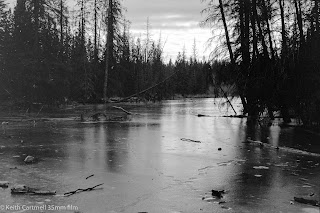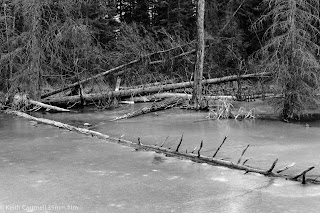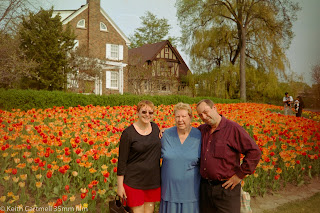One thing about being less active on Facebook is that I've got more time for other things. One of those things is taking one of the cameras for a walk on a more regular basis. The other is having time to read more.
Much of my reading over the last several years has been photo related books, and to some extent that's continuing. As I'm doing my various things I'll come across mention of a book. I now have the library app on my phone, so I go in right then and see if they have it. If so, I'll put it on hold. It might come in a couple days, or like American Gods, it might take lots of months.
Normally I like browsing at my library branch, since I love the serendipity of coming across something unknown, or new on the shelf. But recently the Fish Creek branch has been undergoing extensive renovation and being there isn't much fun. For a while the photography books were in the far corner from the entrance, via a convoluted route.
If a non-photographer knows the name of any photographer besides Ansel Adams, it's likely to be Annie Leibovitz. I'm not particularly into her style of elaborately staged photography, but then, she was often doing fashion, and by my standards that's always a bit weird. Still, these are worth looking at to understand what is possible, and to think about what went into creating the photograph.
Because make no mistake, these are staged and created. They're amazing to look at, though I was often wondering how much a particular photo cost, what with paying for all the materials and the people to set it up, the model(s), Annie and her crew, plus everybody else that's involved. Linda even looked through it, mainly at the costumes, and enjoyed it.
One article I read or watched on photography suggested that the best way to become a famous photographer was to capture lots of good images of famous people, or become famous in some other field and then pick up a camera. Except I don't know anyone that's even moderately famous by the standards of most people and I don't particularly want to become a famous photographer. I just enjoy being out with my camera, or even being in a group without a camera, but thinking about the faces I see, who would be a good subject, what exact fraction of a second I'd click the shutter as expressions flit across their face or the light changes.
As a digression, probably the most famous person I actually know (in the sense I could call them for a coffee date and have a reasonable chance of them accepting) is our city councillor, Dan McLean, and that's because of my position in the Woodcreek Community Association. He might be flattered if I called to ask if I could do his portrait, but I doubt he'd accept. Then again, I doubt he'd accept if one of Annie's staffers called him. But a celebrity, or actor, or fashion model? They'd say yes to an Annie session before the question was finished.
Which reminds me of what happened during my swim the other day. I'm getting into the pool, putting on goggles and nose clip, scoping out who else is in my lane when I hear my name. It turned out to be one of the regulars I've often seen, but never chatted to. She recognized the 'stache from the photo on the cover of the December Chronicle and asked if it was really me. (Hint, I don't choose the covers, our staff do. I supply a choice of images, or get one they want.)
It was. I'd been doing the Santa photos at last year's Skate with Santa event, and usually include adults if they're willing, and especially the volunteers and organizers. Then they insisted that I walk someone through how to operate my camera to take a photo of me with Santa. So there's my 15 seconds of fame.
And now for something completely different. A topic that has been festering in my brain the last little while.
Several books have been about the digital world's assault on our brains. I wrote a bit about it
here and I want to take another run at, trying not to repeat myself.
The current book is Digital Minimalism by Cal Newport. I just finished it. One of his main points is that that the minor tips and tricks, like turning off notifications, is merely disguising the problem, not actually dealing with it. The essential idea is consider your values in life, pick the digital channels that support those, and let the rest go. That's right, turn them off and do without. Find other non digital things to do that you enjoy, and do a digital fast for a month. Or at least do without all the optional stuff, so unless someone is paying you for that bit of phone usage time (your work paying you to monitor email, for example) it's optional. Then after that fast, think carefully about which ones to use, and how.
Rather than installing some app because it offers some minimal or incremental value, consider if it supports your values better than the ones you already have. He mentioned one person buying a wristwatch to know what time it was, because looking at their phone for that was the gateway to checking email, then Twitter, then Facebook, and thence down the rabbit hole to digital hell.
People have been writing about "what's important in life" since we created writing. There's no shortage of advice ranging from "Be Happy" to ponderous tomes that need both hands to pick up.
My take on why people are unhappy often revolves around the word maximum. People want the maximum out of life. They deserve the best. Or rather THE BEST!!! All the time, in everything. Any less is an assault on their sense of self worth. They drive themselves and the people around them hard. They lie, they cheat, they steal. They deserve every ulcer and every bit of blowback they get.
I generally go for what is called a satisficing solution. It's a pragmatic view of the world that says no amount of effort will produce a perfect result, thus putting a maximal effort towards that is futile. Rather, think about what is a solution in the acceptable to good range, and put in the effort to achieve that, then stop. That often results in a compromise solution when other people are involved. And remember, if everybody is unhappy about some aspect of the deal, it's probably a good compromise.
So an example in my photo world. It is possible to spend a great deal of time editing a photo to produce the "ideal" image or to make it the best it can be. There used to be a video showing the Photoshop steps to transform a slice of pizza into a model posing in a bikini, so anything is possible, and that was before AI manipulation or computational photography. I know one person undergoing agonies of editing, re-editing, re-re-editing, masking, massaging, adjusting, tweaking, and I don't even know what all as they prepare for a photo exhibition. Once this process really gets underway, it's hard to know when to stop.
My thinking is that the more one edits a photo, the more it becomes digital art rather than a photograph. (Which is an ok thing if you're intending to produce and market the result as digital art.) But that leads me down a different path than where I'm going now.
I think about what the destination is for my images. Mostly it's the blog. Not that many people look at my blog, in the great scheme of things. I don't think any of them are what we call pixel peepers, diving in to look at every tiny detail with a microscope. I'm pretty sure that for most of my readers, for most of the images, they admire an image they like (and that could be on a phone so how much detail can they see?), and skip over the ones they don't like. (More of his damned driftwood, what is it with that? How many photos of New Zealand driftwood can there be? The answer is about 500 more just from 2020-03. At my current blog production rate that's enough for several more years. Get used to it.) So it's a waste of time highly editing such a photo. Nobody will ever notice, probably not even me.
Just recently I've been doing books of my photos (stay tuned for a blog about them) and those photos get another editing pass to look good in print. (And if I was going to print an image to be framed on my wall, there'd be yet another editing pass to tune it for the specific paper, and a really detailed pass if it was going to be exhibited publicly.)
But I still don't spend a lot of time editing in the sense of working on an individual photo. Much of the time is spent thinking about how many photos, which specific ones, why them, in what order, and what text to go along with them. Part of it is that I pass over the many many photos that aren't so good. I see no point in putting lipstick on what is at best a pig. In some cases if I really want an image, and the one I have is flawed, rather than work to "fix" it, I'll go do another photo. Of course, that isn't always possible.
Back to Digital Minimalism. The other point he makes is that most of us are really good at face to face conversations. Most of us enjoy the social aspect of that, and we've been doing it for tens of thousands of years. The "weak connections" via social media are new and are getting in the way of the strong conversational connections. Really, clicking the like button on the photo of a distant buddy's new baby is only feeding the coffers of Facebook or Twitter. The recipient probably doesn't even look at who the likes are from. It's one of the ways that social media hooks you in, and trivializes the connections between people. People start chasing likes, rather than using the digital connection as a convenient way to arrange a date to get together in person, or somewhat less desirably, a video call.
All too often what gets presented in social media is some idealized image of yourself, as you race to keep up with the "influencers" or celebrities, or your narcissistic buddy who doesn't give a crap about you. Is it any wonder you are unhappy, when your digital avatar gets likes and you know its for the avatar and not you. But maybe that's better than the rejection of presenting yourself and not getting any likes.
A better strategy is to get out of that digital game. Join some group you're interested in and meet real people you might actually like. Converse with them. Go meet people for coffee. Get out into the real world. Go for a walk. Teach yourself how to do something practical. Use digital technologies as appropriate to support those activities.
The more I learn what the digital world is doing to us, the less I want to participate.
Of the Day
Driftwood (NZ)
Driftwood (BC)
Flower and Film (new)
Yukon
Film (old)
My desk back in the days of the Mac Cube. I still have it with that monitor and it still works. Any collectors out there?
























































